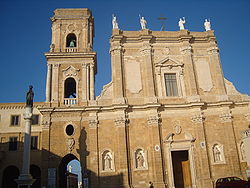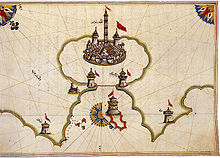Brindisi
Brindisi is a city in the Apulia region of Italy, the capital of the province of Brindisi, off the coast of the Adriatic Sea. Historically, the city has played an important role in commerce and culture, due to its position on the Italian Peninsula and its natural port on the Adriatic Sea. The city is a major port for trade with Greeceand the Middle East. Brindisi has an active industry in agriculture, chemical and energy production.
Territory
The territory of Brindisi is characterized by a wide flat area from which emerge sub deposits of limestone and sand of marine origin, which in turn have a deeper level clay of thePleistocene era, and an even later Mesozoic carbonate composed of limestone and soils. The development of agriculture, has caused an increase in the use of water resources resulting in an increase of indiscriminate use.
Ancient times
There are several traditions concerning its founders; one of them claims that it was founded by the legendary hero Diomedes.
Brindisi was an Ancient Greek settlement predating the Roman expansion. The Latin name Brundisium comes from the Greek Brentesion(Βρεντήσιον) meaning "deer's head", which refers to the shape of the natural harbor. In 267 BC (245 BC, according to other sources) it was conquered by the Romans.[5] In the promontory of the Punta lands, which is located in the outer harbor have been identified as a Bronze Agevillage (16th century BC) where a group of huts, protected by an embankment of stones, yielded fragments of Mycenaean pottery. Herodotusspoke of the Mycenaean origin for these populations. The necropoli of Tor Pisana (south of the old town of Brindisi) returned Corinthian jars in the first half of the 7th century BC. The Brindisi Messapia certainly entertained strong business relationships with the opposite side of the Adriatic and the Greek populations of the Aegean Sea.
After the Punic Wars it became a major center of Roman naval power and maritime trade. In the Social War it received Roman citizenship, and was made a free port by Sulla. It suffered, however, from a siege conducted by Caesar in 49 BC (Bell. Civ. i.) and was again attacked in 42 and 40 BC.
The poet Pacuvius was born here about 220 BC, and here the famous poet Virgil died in 19 BC. Under the Romans, Brundisium – a large city in its day with some 100,000 inhabitants – was an active port, the chief point of embarkation for Greece and the East, via Dyrrachium or Corcyra. It was connected with Rome by the Via Appia and the Via Traiana. The termination of the Via Appia, at the water's edge, was formerly flanked by two fine pillars. Only one remains, the second having been misappropriated and removed to the neighbouring town of Lecce.

